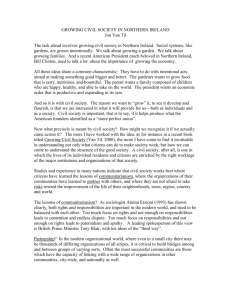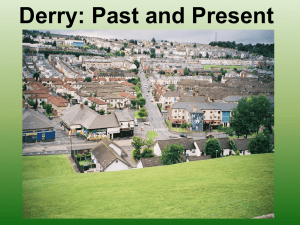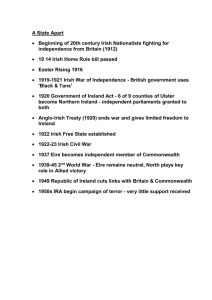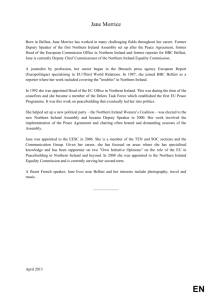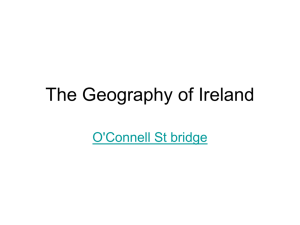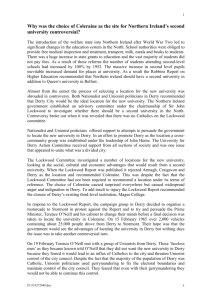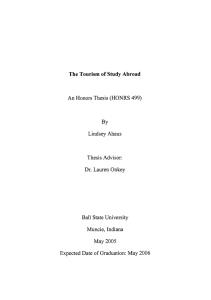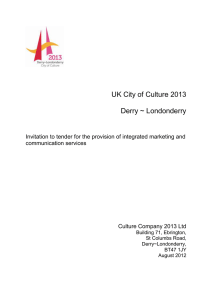Is it not time to recognize a unique geographic region
advertisement
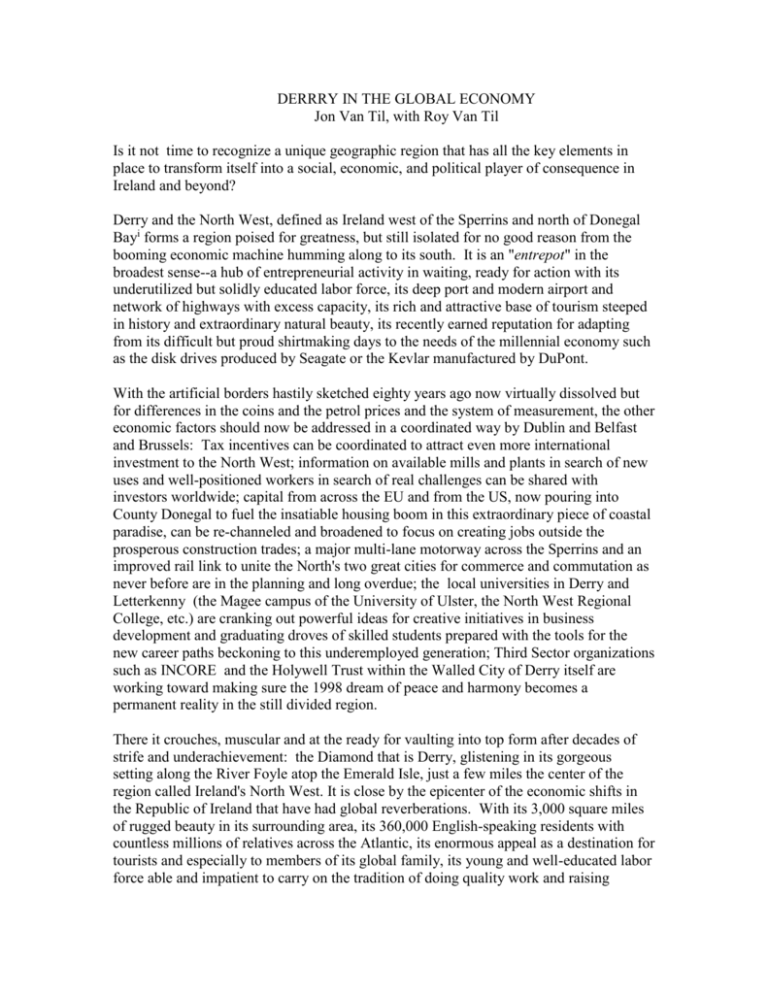
DERRRY IN THE GLOBAL ECONOMY Jon Van Til, with Roy Van Til Is it not time to recognize a unique geographic region that has all the key elements in place to transform itself into a social, economic, and political player of consequence in Ireland and beyond? Derry and the North West, defined as Ireland west of the Sperrins and north of Donegal Bayi forms a region poised for greatness, but still isolated for no good reason from the booming economic machine humming along to its south. It is an "entrepot" in the broadest sense--a hub of entrepreneurial activity in waiting, ready for action with its underutilized but solidly educated labor force, its deep port and modern airport and network of highways with excess capacity, its rich and attractive base of tourism steeped in history and extraordinary natural beauty, its recently earned reputation for adapting from its difficult but proud shirtmaking days to the needs of the millennial economy such as the disk drives produced by Seagate or the Kevlar manufactured by DuPont. With the artificial borders hastily sketched eighty years ago now virtually dissolved but for differences in the coins and the petrol prices and the system of measurement, the other economic factors should now be addressed in a coordinated way by Dublin and Belfast and Brussels: Tax incentives can be coordinated to attract even more international investment to the North West; information on available mills and plants in search of new uses and well-positioned workers in search of real challenges can be shared with investors worldwide; capital from across the EU and from the US, now pouring into County Donegal to fuel the insatiable housing boom in this extraordinary piece of coastal paradise, can be re-channeled and broadened to focus on creating jobs outside the prosperous construction trades; a major multi-lane motorway across the Sperrins and an improved rail link to unite the North's two great cities for commerce and commutation as never before are in the planning and long overdue; the local universities in Derry and Letterkenny (the Magee campus of the University of Ulster, the North West Regional College, etc.) are cranking out powerful ideas for creative initiatives in business development and graduating droves of skilled students prepared with the tools for the new career paths beckoning to this underemployed generation; Third Sector organizations such as INCORE and the Holywell Trust within the Walled City of Derry itself are working toward making sure the 1998 dream of peace and harmony becomes a permanent reality in the still divided region. There it crouches, muscular and at the ready for vaulting into top form after decades of strife and underachievement: the Diamond that is Derry, glistening in its gorgeous setting along the River Foyle atop the Emerald Isle, just a few miles the center of the region called Ireland's North West. It is close by the epicenter of the economic shifts in the Republic of Ireland that have had global reverberations. With its 3,000 square miles of rugged beauty in its surrounding area, its 360,000 English-speaking residents with countless millions of relatives across the Atlantic, its enormous appeal as a destination for tourists and especially to members of its global family, its young and well-educated labor force able and impatient to carry on the tradition of doing quality work and raising quality families, and with its location just 80 miles from Belfast and 150 miles from Dublin, the North West provides fertile ground for an extension of the growth that has transformed the Republic into a spectacular success story for the European Union over the last fifteen years and, much more importantly, a triumph of prosperity and pride for the people of Ireland. Now it is time to share that laudable accomplishment with a city and a region that is deserving and eager for a priceless opportunity to contribute their legendary work ethic and finely honed talents to lifting their special corner of the homeland to a state of grace and glory. The rising tide lifts all boats, as America's and Ireland's favorite son Jack Kennedy said, and that is certainly as true on Lough Foyle as is it on Massachusetts Bay. It is a positive sum game for the stars are truly aligned on this one: The time is right for change, the peace has shown its stamina since 1998, the people are ready for steady employment and growth for the long haul, the young yearn for something way beyond minimum wage service jobs and public assistance, and the civic fabric of the community is working diligently towards reconciliation and integration across the religious chasm. The region has many elegant balances of the charming rural with the dynamic urban, new skills with old work ethics, the vitality of new developments with the perspective gained from its eternal walls, and the promise of the future woven into a fabric of strength tested over fifteen centuries of great but tumultuous history. For years neglected by Belfast, London, and Dublin as a backwater region, the North West now seems better positioned on both social and political grounds than those in the conventionally more privileged Belfast-centered region of Northern Ireland. It is Belfast where paramilitary power rises while political stalemate persists. It is Belfast where ghettos breed the deepest alienation, walls insure the highest isolation, and hopes fade most sadly that peace might someday bring understanding. In the North West, on the other hand, the ghettos are not so deeply mired, the walls are not so high, and hope remains that ways may be developed to find a global role. With a civil society structure that allows for communication across both river and tradition, with a political structure that sometimes moves beyond caricature and posture to the address of real concerns, with an economic base poised to at least compete, and with an ethnonational base that mirrors the structure of the island as a whole—it is the North West that may be better poised to lead on in the new millennium. To be sure, the gods give no guarantees that this finest chapter will be written in this far Irish corner. The story of this island’s past evokes a litany of divisions among competing provinces and religions and classes and lands beyond. The greater story, yet to be lived or written, would tell of a widening harmony across the circles with which this telling began: over the walls to the Bogside and the Waterside, into Donegal and throughout Ulster, and across the island of Ireland, and to England. Because the global society knows no bounds, the story would extend to Europe, America, and the rest of the globe, for there will continue to be found communication, trade, and growth. In every corner of the globe, after all, there exists a desperate need to learn how even the most pernicious of conflicts can ultimately be resolved. And it is that achievement that today stands within reach in Ireland’s North West. _______________________________________________________________________ Jon Van Til will return to Derry at the end of the January to help Swarthmore College’s student participants in a semester abroad program learn about their new hometown for the Spring term, the city of Derry/Londonderry. Van Til is the author of a new book, Breaching Derry’s Walls: The Quest for a Lasting Peace in Northern Ireland, published by University Press of America. The article above is excerpted from that book. Breaching Derry’s Walls is the first book to examine the island-based society of Ireland from the point of view of its Northwest quadrant. In particular, Derry, a city long known as a center for culture, plays a central role in Professor Van Til’s research. Dividing his sections historically pertaining to societies and conflicts, Van Til draws upon his personal experience as a Fulbright scholar to provide a fresh and original way of conceptualizing Ireland and all its facets. Appealing to students and conflict specialists, this book implements a new vantage point for understanding the Northern Ireland region. Van Til, a 1961 graduate of Swarthmore College, is Professor of Urban Studies at Rutgers University, Camden (New Jersey, USA). He has served as Fulbright Distinguished Scholar (2004) and Fulbright Senior Specialist (2006) at the University of Ulster, and is the author of ten books, including MAPPING THE THIRD SECTOR (1988) and GROWING CIVIL SOCIETY (2000). Van Til served as Editor-in-Chief of the Nonprofit and Voluntary Sector Quarterly from 1977-1989, was twice elected president of the Association for Research in Nonprofit Organization and Voluntary Action (ARNOVA), and received that association’s Career Award for Distinguished Research and Service in 1994. Roy Van Til, a consulting economist based in Farmington, Maine, joined his brother in writing several chapters of Breaching Derry’s Walls, including the excerpt provided above. Roy is currently developing a contextual atlas on the North West of Ireland. i Specifically, all of County Donegal in the Republic plus the districts of Limavady and Derry in western County Londonderry along with the inland districts of Strabane and Omagh in western County Tyrone.
